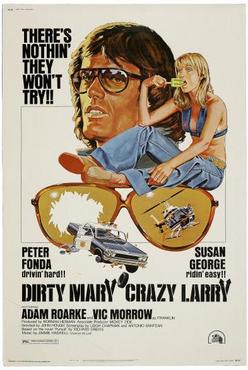 The following is my contribution to the 2nd Annual White Elephant Blog-a-Thon.
The following is my contribution to the 2nd Annual White Elephant Blog-a-Thon.Susan George is awesome in Dirty Mary Crazy Larry. We first see her lounging on a motel bed after a one-night stand with stock car driver turned criminal Larry (Peter Fonda) in a shot that (perhaps deliberately) recalls Faye Dunaway at the start of Bonnie and Clyde - she's tense, restless, looking for trouble. It's this urge for sensory gratification that is at the heart of the road movies that populated drive-ins in the '60s and '70s, promising high speed and vehicular mayhem with a fast, cool car driven by a free spirit set adrift on the open road. While Dirty Mary Crazy Larry doesn't have the potent existential kick of Vanishing Point or Two-Lane Blacktop (films that it pretty blatantly steals from), it does have a certain goofy charm. Like most of the films from John Hough, it has a meat-and-potatoes approach to its material, delivering on its modest promises - sometimes, a pretty girl in a fast car is enough.
Like Two-Lane Blacktop, Dirty Mary Crazy Larry is about a driver, his mechanic and the girl along for the ride. After robbing a grocery store, Larry and Deke's (Adam Roarke) getaway is complicated by Larry's most recent conquest, who repeatedly manipulates her way into going along for the ride. The first half of the movie makes clear what Quentin Tarantino was going for with Death Proof - there's little action, with most of the scenes focused on the tension between Larry (who constantly mocks Mary for being a chick) and Mary (who acts disgusted with Larry but goes along for the ride anyway). Much of this may be meant to pad the movie to feature length, but it's also an interesting little time capsule of gender relations in 1974. While I don't think Hough meant Dirty Mary Crazy Larry as a feminist statement, it's fun to watch a '60s icon (embodying the casual misogyny of the peace-and-love generation) meet his match in an unapologetically carnal '70s woman (recall the introduction of George, defiantly braless, in Straw Dogs). That gender politics made their way into a straightforward B-picture may or may not be representative of the paradigm shift happening at the time (certainly, tough-talking women existed in cinema before women's lib); either way, though, I imagine it at least gave the ladies who'd been dragged to the film by their boyfriends and husbands something to laugh at.
For any of its superficial nonconformist iconography, however, Dirty Mary Crazy Larry is squarely a product of the establishment. Consider the character of Captain Franklin (Vic Morrow), an old-school lawman determined to catch Mary, Larry and Deke. Morrow was a pro at playing grizzled, miserable bastards, and Franklin could be the perfect foil for the protagonists. Except that the film makes the odd choice of making Franklin a different kind of antihero, rebelling against bueracracy and modernity (he hates computers) in his obsessive pursuit of the trio. By making Franklin and Larry two sides of the same coin - both raging against the tide of change - the movie never approaches the radicalism of its predecessors. In a sense, it anticipates the mainstream co-opting of a very independent subgenre, with Morrow's Franklin only a few evolutionary steps away from Buford T. Justice.
The most important thing, though, is the car chases, and on this definitely delivers. The film's second half is an almost nonstop chase that delivers on the tagline's promise of "PETER FONDA drivin' hard!!" Watching Larry's Dodge Charger evade cop cars and even a chopper, it's hard not to be filled with the basic, childish glee of seeing the bad guys get away. Dirty Mary Crazy Larry is fast-paced, unpretentious fun, at least until its final minute. Looking around the internet, I see that the ending is quite admired for its unpredictability, but I was frankly thinking "wouldn't it be funny if - " when it happened. It's too much of an attempt to match the bleakness of Vanishing Point and Easy Rider, except that grafted onto a pretty light-hearted film, it's just hilariously arbitrary. As poetry Dirty Mary Crazy Larry leaves a lot to be desired, but it's pretty damn good pulp.
5 comments:
Nice write-up and comment on sexual politics, which were indeed rife in films of that time. It sounds like you drew a good "bad" movie--maybe not a bad movie at all!
Definitely. It's goofy, but I'd gladly watch it again.
Hey man. Looks like you and I both got pretty lucky with the movies Ben drew for us. I'm sort of afraid of what I'll get next year.
Aw, who am I kidding? I didn't enter the White Elephant Blogathon to get something good, did I? Bring on the junk!
Surely, the dude is absolutely fair.
Love it. Why was it deleted?
Post a Comment